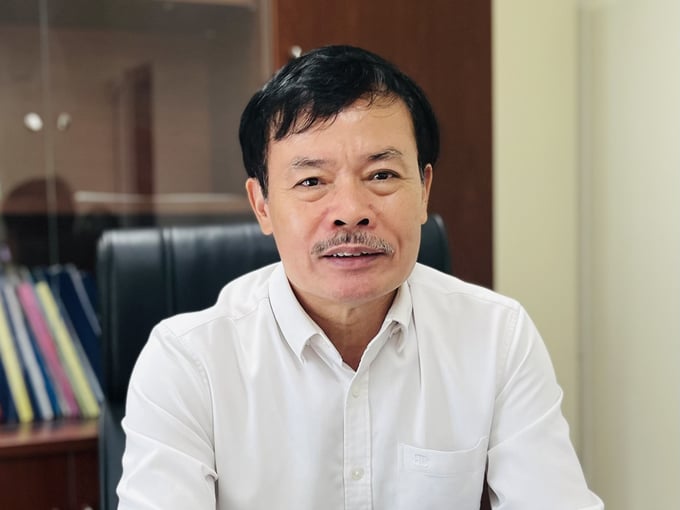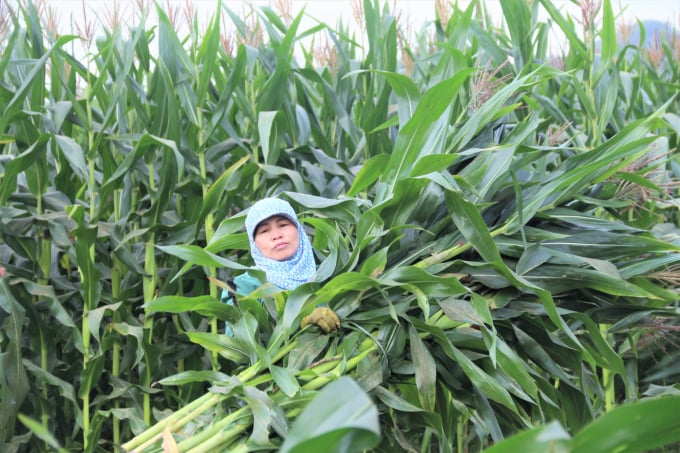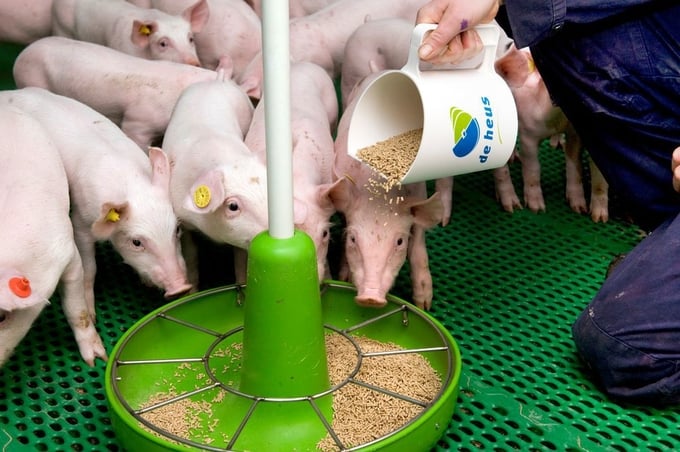November 27, 2025 | 22:04 GMT +7
November 27, 2025 | 22:04 GMT +7
Hotline: 0913.378.918
November 27, 2025 | 22:04 GMT +7
Hotline: 0913.378.918

According to Mr. Nguyen Xuan Duong, Chairman of the Vietnam Livestock Association, our country's livestock industry has many advantages but also faces countless challenges. Photo: Hong Tham.
Following the ups and downs of the livestock production industry, a number of people have questioned whether or not animal husbandry is one of our strengths, what is your stance on this matter?
It is true that compared to other nations, Vietnam lacks the land resources to develop industrial-scale livestock production. However, our livestock production is not too inferior to others.
Initially, the demand for livestock products in the Asia-Pacific region and other nations continues to increase. The current legal institutions and development policies of the livestock production industry have been perfected and deemed suitable for the industry's promotion when they are utilized effectively.
Second, businesses have made substantial investments to modernize and synchronize the technical and material infrastructure supporting livestock production. The production of livestock has been reorganized in accordance with the link chain, under the course of large-capacity businesses. This is a crucial foundation for the development of the commodity industry in accordance with market demands.
Expansion of livestock production creates more opportunities for international collaboration, and exchanges of science, technologies, breeds, livestock, and veterinary materials, among others.
What about the restrictions, such as the "curse" that MARD Minister Le Minh Hoan once emphasized regarding "fragmentation, smallness, and spontaneousness", sir?
That's correct! They are the three greatest obstacles to agriculture in general and animal husbandry in particular. These disadvantages have led to an increase in the prevalence of diseases, particularly those with a new mode of transmission, resulting in higher production costs and increased financial burdens for animal husbandry.
In addition, the domestic livestock products market is under increasing pressure as a result of declining purchasing power, the growing availability of imported foods, particularly inexpensive foods, and the issue of informal livestock product imports across border provinces.
Imports of animal feed constituents and production input materials continue to rise, resulting in a loss of supply and cost autonomy for domestic production.
As the deadline for implementing these regulations, January 1, 2025, approaches, environmental pressure and the relocation of livestock facilities out of areas where livestock cultivation is prohibited under the Livestock Law and Environmental Law will be a major challenge for the livestock industry.
The increasing demands of the market for livestock products in terms of food safety, environmental tolerance, the sharing economy, and humane treatment of animals are exerting significant pressure on livestock husbandry.
Vietnam's livestock populations are among the largest in the world, exerting significant pressure on environmental factors and resources... resulting in a shrinking livestock agricultural space.

It is necessary to grow corn to get biomass as food for grazing livestock. Photo: Hong Tham.
In addition to internal subjective causes, is a reliance on imported feed raw materials a contributing factor to the difficulties confronting Vietnam's livestock industry today?
Vietnam's livestock industry is constrained by the issue of animal fodder materials. This has not just been discussed but has been "repeatedly stated" numerous times in the past. We have taken steps to become partially self-sufficient in basic materials, but the results have not been as anticipated.
Vietnam lacks comparative advantages in the production of feed raw materials, particularly large raw materials such as cereals, maize, wheat, oil cakes, and soy meal, and therefore must import password.
To surmount this limitation, in my opinion, first of all, it is necessary to economically and effectively use feed raw materials, both imported and domestic, with scientific and technological solutions, raw material management and production organization.
Second, consider the country's ability to be partially self-sufficient in animal feed materials, particularly those derived from agricultural and industrial byproducts. It can be refined and utilized as a feed ingredient.

In our country's livestock structure, number 1 is still pigs, number 2 is poultry, and number 3 is buffalo and cows. Photo: Hong Tham.
We have fruit processing products that are suitable for silage and fermentation, as well as abattoir products, particularly seafood, that can be fermented and hydrolyzed to increase nutritional value.
It is possible to organize the production of certain commodities for animal fodder in which the nation has a comparative advantage, notably the farming system for seaweed, seaweed, and insects. It is necessary to cultivate maize in order to obtain biomass for grazing livestock.
It is possible for us to reduce the cost of importing animal feed materials by reducing the costs of inspection, administrative procedures, and quarantine.
Fourth, a substantial investment in logistics is required. Currently, domestic transportation costs in Vietnam are 10-15% greater than the regional average. If a logistics system exists, food costs will decrease. Lastly, it is necessary to modify the livestock structure by reducing the number of animals that consume a great deal of cereal and increasing the number of grass-fed animals.
Thank you!
Translated by Linh Linh

(VAN) After the institutional merger, Da Nang possesses significant forest-carbon reserves and is proactively engaging in the carbon market, creating a new revenue stream.

(VAN) An Giang strengthens communication against IUU fishing, increases inspections and sanctions, and is determined to remove the EC’s “yellow card” while developing a sustainable fisheries sector.

(VAN) As green transition becomes a global trajectory, Viet Nam’s biggest challenge is not only technology and models, but how to ensure that capital flows reach the right beneficiaries.

(VAN) The Ministry of Agriculture and Environment must spearhead the construction of green governance, spanning decision-making processes and investment standards to policy evaluation mechanisms.

(VAN) The Agriculture and Environment sector of Khanh Hoa has achieved numerous milestones over the past 80 years, contributing significantly to the goal of establishing the province as a centrally governed city by 2030.

(VAN) Viet Nam is entering the pivotal period of 2025-2030, moving toward the formulation of the Remote Sensing Law, which will establish a legal foundation for the development of national digital data.

(VAN) The agricultural sector is finalizing the strategic framework for emission reduction, setting the goal of sharply cutting methane and 403.7 million tons of CO2 equivalent and moving toward Net Zero by 2050.